Connect With Us
Blog
Items filtered by date: January 2023
Types and Symptoms of Achilles Tendonitis
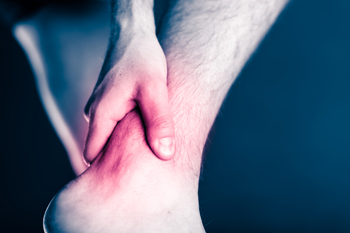
Achilles tendonitis is the inflammation of the Achilles tendon, the long tendon that connects the calf muscles to the back of the heel. The Achilles tendon is used every time you walk, run, jump, or push up onto your toes. Tendonitis is considered to be an overuse injury and is especially common among runners who increase their distance or speed too quickly. Achilles tendonitis can also affect middle-aged people who play sports, such as tennis and basketball, but only play on weekends. Pain of Achilles tendonitis usually starts out with an ache above the heel and progresses after longer bouts of running, stair climbing, or sprinting. Other symptoms are tenderness or stiffness in the morning that dissipates with some activity. If such activities continue and increased pain is ignored, Achilles tendonitis can lead to ruptures that may require surgery. If pain in the back of your heel persists or worsens, please consult a podiatrist for an examination and suggested treatment options.
Achilles tendon injuries need immediate attention to avoid future complications. If you have any concerns, contact Dr. Rouder of S.I. Podiatry. Our doctor can provide the care you need to keep you pain-free and on your feet.
What Is the Achilles Tendon?
The Achilles tendon is a tendon that connects the lower leg muscles and calf to the heel of the foot. It is the strongest tendon in the human body and is essential for making movement possible. Because this tendon is such an integral part of the body, any injuries to it can create immense difficulties and should immediately be presented to a doctor.
What Are the Symptoms of an Achilles Tendon Injury?
There are various types of injuries that can affect the Achilles tendon. The two most common injuries are Achilles tendinitis and ruptures of the tendon.
Achilles Tendinitis Symptoms
- Inflammation
- Dull to severe pain
- Increased blood flow to the tendon
- Thickening of the tendon
Rupture Symptoms
- Extreme pain and swelling in the foot
- Total immobility
Treatment and Prevention
Achilles tendon injuries are diagnosed by a thorough physical evaluation, which can include an MRI. Treatment involves rest, physical therapy, and in some cases, surgery. However, various preventative measures can be taken to avoid these injuries, such as:
- Thorough stretching of the tendon before and after exercise
- Strengthening exercises like calf raises, squats, leg curls, leg extensions, leg raises, lunges, and leg presses
If you have any questions please feel free to contact our office located in Staten Island, NY . We offer the newest diagnostic tools and technology to treat your foot and ankle needs.
Hard and Soft Corns
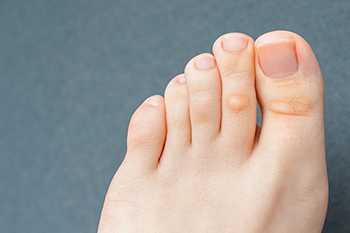
Corns can cause patients to have severe pain, despite their small size. They can develop as a result of excess friction, which generally happens from wearing shoes that do not fit correctly. A common area where a corn can be found in the side of the pinky toe. The pain can be so severe, that larger shoes may need to be purchased to lessen its severity. Corns that form between the toes are called soft corns, as they are consistently moist from the sweat that is found there. Some patients have corns that form on top of the toes, and this may be from an existing bunion or hammertoe. Patients who have small corns may find mild relief when the foot is soaked in warm water, followed by using a pumice stone that can wear the dead skin away. For more severe corns, it is suggested that a podiatrist be contacted, who can prescribe medicine that may shrink it, or possibly trim it surgically.
Corns can make walking very painful and should be treated immediately. If you have questions regarding your feet and ankles, contact Dr. Rouder of S.I. Podiatry. Our doctor will treat your foot and ankle needs.
Corns: What Are They? And How Do You Get Rid of Them?
Corns are thickened areas on the skin that can become painful. They are caused by excessive pressure and friction on the skin. Corns press into the deeper layers of the skin and are usually round in shape.
Ways to Prevent Corns
There are many ways to get rid of painful corns such as:
- Wearing properly fitting shoes that have been measured by a professional
- Wearing shoes that are not sharply pointed or have high heels
- Wearing only shoes that offer support
Treating Corns
Although most corns slowly disappear when the friction or pressure stops, this isn’t always the case. Consult with your podiatrist to determine the best treatment option for your case of corns.
If you have any questions please feel free to contact our office located in Staten Island, NY . We offer the newest diagnostic and treatment technologies for all your foot and ankle needs.
Types of Insoles
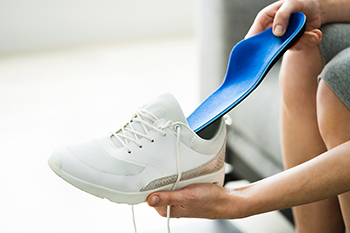
Foot pain can be caused for a variety of reasons, but ill-fitting shoes are the biggest culprit. And if shoe fit is the reason for foot pain, insoles can be the first line of defense. Insoles are the soft cushions that fit inside most shoes. They work as shock absorbers for the feet. If one wears the same shoe every day, the insoles can start to break down and may need to be replaced. There are different insoles for different needs. An insert, insole, and orthotic are often terms that are used interchangeably, however, they are different. An insert is a thin piece of shoe padding or gel cushion that is placed in shoes to provide relief to pain in heels, arches, and forefeet. They are used for shock absorption, cushioning against pressure, and keeping the feet supported while walking. Insoles are general-purpose, off-the-shelf overlays for shoes that are made of foam. Orthotics are customized inserts that are used to control movement in the feet and legs. They are typically made to order. Visiting a podiatrist is suggested for the proper determination of the best type of insole for your foot discomfort.
Foot Pain
Foot pain can be extremely painful and debilitating. If you have a foot pain, consult with Dr. Rouder from S.I. Podiatry. Our doctor will assess your condition and provide you with quality foot and ankle treatment.
Causes
Foot pain is a very broad condition that could be caused by one or more ailments. The most common include:
- Bunions
- Hammertoes
- Plantar Fasciitis
- Bone Spurs
- Corns
- Tarsal Tunnel Syndrome
- Ingrown Toenails
- Arthritis (such as Gout, Rheumatoid, and Osteoarthritis)
- Flat Feet
- Injury (from stress fractures, broken toe, foot, ankle, Achilles tendon ruptures, and sprains)
- And more
Diagnosis
To figure out the cause of foot pain, podiatrists utilize several different methods. This can range from simple visual inspections and sensation tests to X-rays and MRI scans. Prior medical history, family medical history, and any recent physical traumatic events will all be taken into consideration for a proper diagnosis.
Treatment
Treatment depends upon the cause of the foot pain. Whether it is resting, staying off the foot, or having surgery; podiatrists have a number of treatment options available for foot pain.
If you have any questions, please feel free to contact our office located in Staten Island, NY . We offer the newest diagnostic and treatment technologies for all your foot care needs.
The Feet May Be the First Area to Be Affected by RA
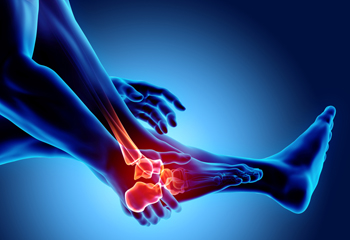
Arthritis can affect any joint in the body, and the most common type is rheumatoid. Many people who have this condition often have foot problems, and the feet can be the first area of the body where pain is noticed. Some of the symptoms that are associated with this can include soreness, swelling, and the affected area in the foot may feel warm when touched. The joints that are commonly affected with this type of arthritis are the smaller joints of the toes. This may hinder the ability to walk, maintain balance, and completing daily tasks may become difficult. Some patients develop skin and nail problems as a result of having rheumatoid arthritis, and it is advised that the advice of a podiatrist is sought who can offer correct treatment remedies.
Arthritis can be a difficult condition to live with. If you are seeking treatment, contact Dr. Rouder from S.I. Podiatry. Our doctor can provide the care you need to keep you pain-free and on your feet.
Arthritic Foot Care
Arthritis is a joint disorder that involves the inflammation of different joints in your body, such as those in your feet. Arthritis is often caused by a degenerative joint disease and causes mild to severe pain in all affected areas. In addition to this, swelling and stiffness in the affected joints can also be a common symptom of arthritis.
In many cases, wearing ill-fitting shoes can worsen the effects and pain of arthritis. Wearing shoes that have a lower heel and extra room can help your feet feel more comfortable. In cases of rheumatoid arthritis, the arch in your foot may become problematic. Buying shoes with proper arch support that contour to your feet can help immensely.
Alleviating Arthritic Pain
- Exercises that stretch the foot can prevent further pain and injury and increase mobility
- Most of the pain can be alleviated with anti-inflammatory drugs, heat, and topical medications
- Massages can help temporarily alleviate pain.
It is best to see your doctor for the treatment that is right for your needs and symptoms. Conditions vary, and a podiatrist can help you determine the right method of care for your feet.
If you have any questions, please feel free to contact our office located in Staten Island, NY . We offer the newest diagnostic tools and technology to treat your foot and ankle needs.
Gout Pain Can Be Managed
Tips for Preventing Falls for Seniors
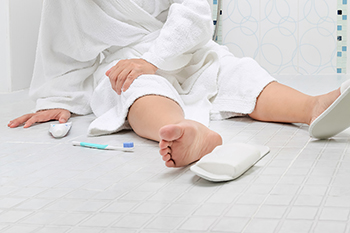
Each year millions of seniors over 65 years old fall, putting them at risk of serious injury, including broken bones or head wounds. Further, experts say that falling once increases a senior’s chances of falling again. It is well known that most falls by seniors happen in or around the home. Fortunately, there are a number of things that can help to prevent falling in your home. Simple changes in the home include removing throw rugs that are easy to trip over and clutter on the floor or hallways. In addition, it is wise to eliminate other tripping hazards, such as wires, boxes, and furniture, from pathways you are likely to use. Fixing steps and walkways that may be uneven, both inside and outside the house, is suggested. Installing adequate lighting or night lights in higher-traffic areas is essential. Adding grab bars in the bathroom and shower areas, and banisters on stairways is recommended. Getting regular light exercise to keep the leg muscles strong is also a good idea. For more information on more ways to prevent falling, please consult a podiatrist.
Preventing falls among the elderly is very important. If you are older and have fallen or fear that you are prone to falling, consult with Dr. Rouder from S.I. Podiatry. Our doctor will assess your condition and provide you with quality advice and care.
Every 11 seconds, an elderly American is being treated in an emergency room for a fall related injury. Falls are the leading cause of head and hip injuries for those 65 and older. Due to decreases in strength, balance, senses, and lack of awareness, elderly persons are very susceptible to falling. Thankfully, there are a number of things older persons can do to prevent falls.
How to Prevent Falls
Some effective methods that older persons can do to prevent falls include:
- Enrolling in strength and balance exercise program to increase balance and strength
- Periodically having your sight and hearing checked
- Discuss any medications you have with a doctor to see if it increases the risk of falling
- Clearing the house of falling hazards and installing devices like grab bars and railings
- Utilizing a walker or cane
- Wearing shoes that provide good support and cushioning
- Talking to family members about falling and increasing awareness
Falling can be a traumatic and embarrassing experience for elderly persons; this can make them less willing to leave the house, and less willing to talk to someone about their fears of falling. Doing such things, however, will increase the likelihood of tripping or losing one’s balance. Knowing the causes of falling and how to prevent them is the best way to mitigate the risk of serious injury.
If you have any questions, please feel free to contact our office located in Staten Island, NY . We offer the newest diagnostic and treatment technologies for all your foot care needs.

